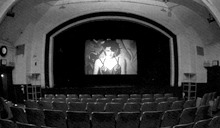
Brattle’s Independent Spirit
Written by Sabina Dana Plasse | Posted by: Anonymous
According to Anthony Kaufman of The Village Voice, independent film died on May 2, 2002. This fateful day signifies Universal Studios acquisition of Good Machine, a film company whose name embodied the very essence of "indie." The genius of Good Machine’s James Schamus and Ted Hope created independent classics such as Hal Hartley’s "Simple Men" (1992), Ang Lee’s "The Wedding Banquet" (1993) and, most recently, Todd Field’s "In the Bedroom" (2002) to name a few. Although this loss may truly end an unprecedented era in American independent cinema, there are those individuals who still honor the existence of the independent film.
Ivy Moylan and Ned Hinkle are two such film visionaries who believe independents have a future and their home is at The Brattle Theatre in Harvard Square. Through their love of cinema, networking skills, and Boston-based ideals of film and culture, Moylan and Hinkle acquired the Brattle to create an alternative theater that satisfies the public’s more discriminate tastes.
Beginning as a repertory theater in 1953, The Brattle Theatre has a history dedicated to screening independent minded films.
"The Brattle has always been an art house," says Hinkle. "It was one of the first to screen the foreign films of Bergman, Godard, Truffaut, Kurosawa and all the great auteurs of the 40’s, 50’s and 60’s continuing since we took over last year… It has been a center for independent film, challenging foreign film, and rediscovering old classics."
This tradition of diversity and cultural awareness within cinema are the very basis for Moylan and Hinkle’s decision to make The Brattle Theatre into the non-profit Brattle Film Foundation, "an educational and cultural institution which also aims to be a historical preservation institute in the future," describes Moylan. "We need funding and that’s why we made it a non-profit."
The Brattle Film Foundation not only celebrates film as art but also the preservation of cinema; eventually it plans for the distribution of movies as well. The idea of distribution within the Foundation will perhaps fill the need of those independents who have no alternatives for their films.
"One of our agendas is to grow an independent leg. In a sense, our mission is trying to increase visibility for the smaller American independent films," Moylan explains. "We are going out of our way to program films that are not screening in Boston and to satisfy both our need for product and getting these types of films seen."
Through partnerships, theater rentals, programs like the Boston Cinema Census, local film events and festivals, the Brattle has made many efforts to help local filmmakers show their work. Yet, they understand the difficulties of screening independent films.
"The hard thing about being a theatrical exhibitor versus a non-theatrical such as the MFA (Museum of Fine Arts) is if a film is fighting for distribution it cannot play here," Moylan says. "They cannot overexpose a film in one city because it loses the value of the film for the distributor and their window of opportunity will close."
Hinkle confirms the challenge of properly releasing an independent film to audiences. "The nuts and bolts of the business are — if you produce a feature film in Boston and want to sell it to a major distributor, it’s harder for us to gain excitement for it because it can’t play in Boston," Hinkle says. "[The filmmakers] want a distributor to pick up the film and Boston is one of their top 10 markets. Distributors don’t want that to be depleted because if a film has already played and already received press — it won’t get covered again."
Besides the difficulties of distribution, independents face another challenge that Moylan and Hinkle have uncovered. Independent films need star power for distribution.
"You have to have a hook. There has to be a big star in the film or it’s a big director working on a small budget. For independent films to get distribution there has to be a star and the stars are less and less interested in being in a film for no money," Hinkle says. Perhaps it’s this principle that has barred independent cinema and caused its absorption into the studio system (such as the fate of Good Machine).
But there are other means to fulfilling the independent fix — such as the Brattle Theatre. Due to their strong reputation and the Harvard Square-Cambridge community, the Brattle Theatre has the benefit of a dedicated audience.
"We know our audience and we take chances on films that other theaters will not such as Richard Kelly’s ‘Donnie Darko’ (2001), the Wim Wenders film ‘The Million Dollar Hotel’ (2000) and Richard Linklater, who came with his latest film ‘Waking Life’ (2001)," Moylan says. "There is a very strong audience here. The films that do well at the Brattle have a very introspective, intelligent feel and are usually ones that don’t do well in other places."
Yet Hinkle explains that don’t hold smaller films to the same revenue expectations as larger films. "Anchor films that generate money and hold on will allow you to play smaller films. It is easier for us to balance a film like James Toback’s ‘Harvard Man’ (2001) which is independent but will bring in a big audience so you can counterbalance smaller films," Hinkle says.
The support of the community has proved extremely beneficial to the Brattle’s place as a serious alternative cinema. As a venue for film festivals and repertory, local film aficionados highly regard the Brattle for its programming.
"Festivals are great because of what it does to the audience and to the community. It is very revitalizing. It gets people really excited and reminds them of taking chances which is huge," Moylan says. "Movies are experience… It’s one of our core values that you’ll see things you’ll never see anywhere in Boston."
Moylan and Hinkle are determined to make the Brattle an independent theater landmark in Cambridge. "It’s nice to know what a Brattle movie is because it implies a certain quality," says Hinkle.
"We want to continue the tradition of the Brattle Theatre. We chose to get involved with the Brattle because we are independent-minded people," says Moylan. "We are very determined to make people learn that there is an alternative cinema here." The Brattle deems itself as the unofficial film school for Boston and its survival as an independent theater is essential.
Moylan and Hinkle’s work has inherently brought a new perspective to the theater and people are paying attention. Their aggressive approach, commitment to product and well-rounded programming has proven quite effective, especially in establishing a new identity for the Brattle Theatre and its future enterprises. Providing provocative and innovative films is a challenge but one in which Moylan and Hinkle battle with great spirit and extraordinary planning.
The Brattle Theatre is located at 40 Brattle Street Harvard Square in Cambridge, MA. For a schedule and film listings visit the web site at www.brattlefilm.org or call for information (617) 876-6837. Boston Film & Video Foundation is a non-profit organization that balances the development of artists, the presentation of their work, and the education of its audience. For more information, please visit www.bfvf.org.










